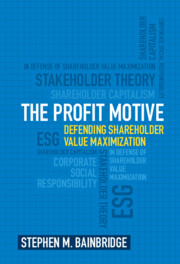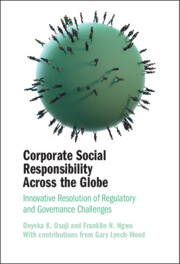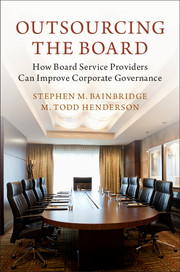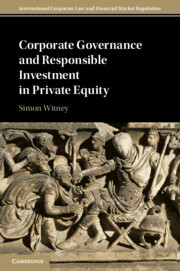The Profit Motive
What responsibility, if any, does a corporation have to society? How should corporations balance environmental, social, and governance factors? The Profit Motive addresses these questions of corporate purpose using historical, legal, and economic perspectives. Stephen M. Bainbridge enters the debate around corporate social responsibility to mount an unabashed defense of shareholder capitalism and maximizing shareholder value. The book offers context for the current questions about corporate purpose, and provides a reference going forward. Direct and corrective, The Profit Motive argues that shareholder value maximization is not only required by law, but what the law ought to require.
- Provides both legal and policy analysis of corporate purpose and responsibility
- Explains the law governing the purpose of the corporation
- Explains how corporate social responsibility and ESG exacerbate the principal-agent problem in public corporations
Reviews & endorsements
‘The Profit Motive is both a brilliant defense of the principle at the heart of capitalist prosperity and a clinical demolition of ‘stakeholder’ theory. A true master of his craft, Bainbridge not only knows everything worth knowing about his subject but expresses it with vigor, grace and, a wry sense of humor. A must-read for anybody who wants to understand what makes corporations thrive--and how to preserve them from death by good intentions.’ Adrian Wooldridge, Bloomberg Opinion
‘Professor Bainbridge has authored an extraordinary book. It is both superb scholarly and yet at the same time highly accessible to the non-lawyer. This is a must read both for corporate law scholars and, more importantly, the public company director community.’ Charles M. Elson, University of Delaware
‘Professor Bainbridge brings his unsurpassed expertise and scholarship around corporate governance to the discussion of ESG and stakeholder capitalism, convincingly arguing that the notion of business extending its focus beyond shareholders has no basis in the law, provides no actionable guidance to corporate directors, and ultimately yields no benefit to society.’ Marc Hodak, Farient Advisors
‘Should directors of business corporations seek to maximize value for the corporation’s shareholders, or should they make business decisions with a view to benefiting all corporate stakeholders? Professor Bainbridge’s conclusions are thunderingly unequivocal: shareholder value maximization is both what the law requires and what the law ought to require; in the long run, it produces the best outcomes for shareholders and other constituencies and is the system appropriate for a democratic society. Everyone interested in what is happening in corporate America today - and how it could affect them, economically and otherwise - should read this book.’ Robert T. Miller, University of Iowa College of Law
'… having put a stake through the heart of stakeholder capitalism, Bainbridge provides a powerful moral rationale for shareholder primacy … Samuel Gregg, Law & Liberty
Product details
February 2023Hardback
9781316515471
300 pages
235 × 157 × 18 mm
0.48kg
Available
Table of Contents
- Introduction
- Part I. The Law:
- 1. The Battle of River Rouge
- 2. Fireplug Funding For Princeton
- 3. Why Didn't the Cubs Have to Play Night Baseball? 4. Defending Dodge
- 5. To Make Stakeholder Capitalism the Rule, You Would Have to Change Most of Corporate Law
- 6. What About the Benefit Corporation? Part II. The Merits:
- 7. Possible Merits of the Business Roundtable's Embrace of Stakeholder Capitalism
- 8. Was There a Business Case for the Business Roundtable's Embrace of Stakeholder Capitalism? 9. Why did the Business Roundtable CEOs Shift Their Position?10. Why the Business Roundtable CEOs Should Have Stayed the Course
- Conclusion.






